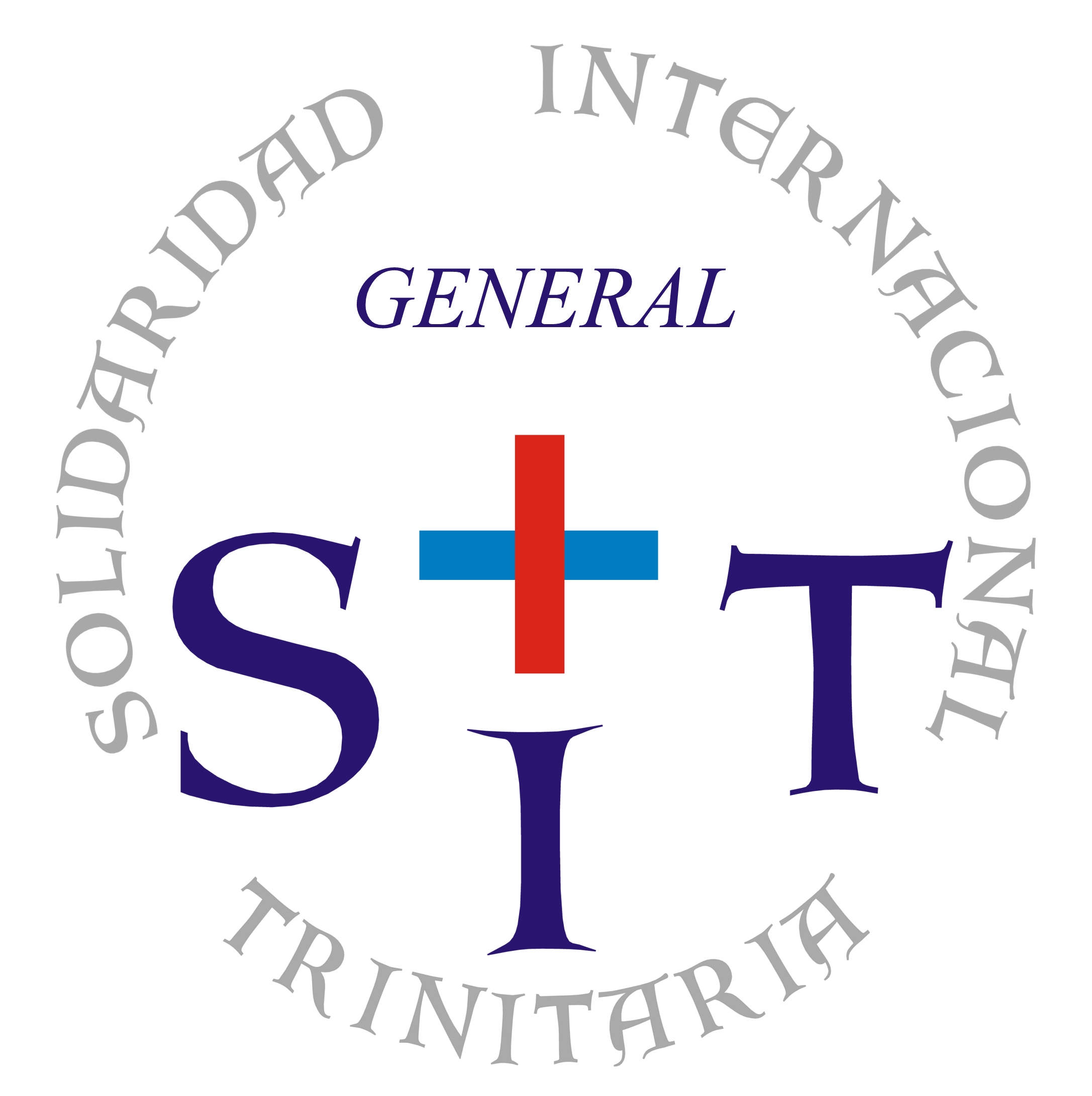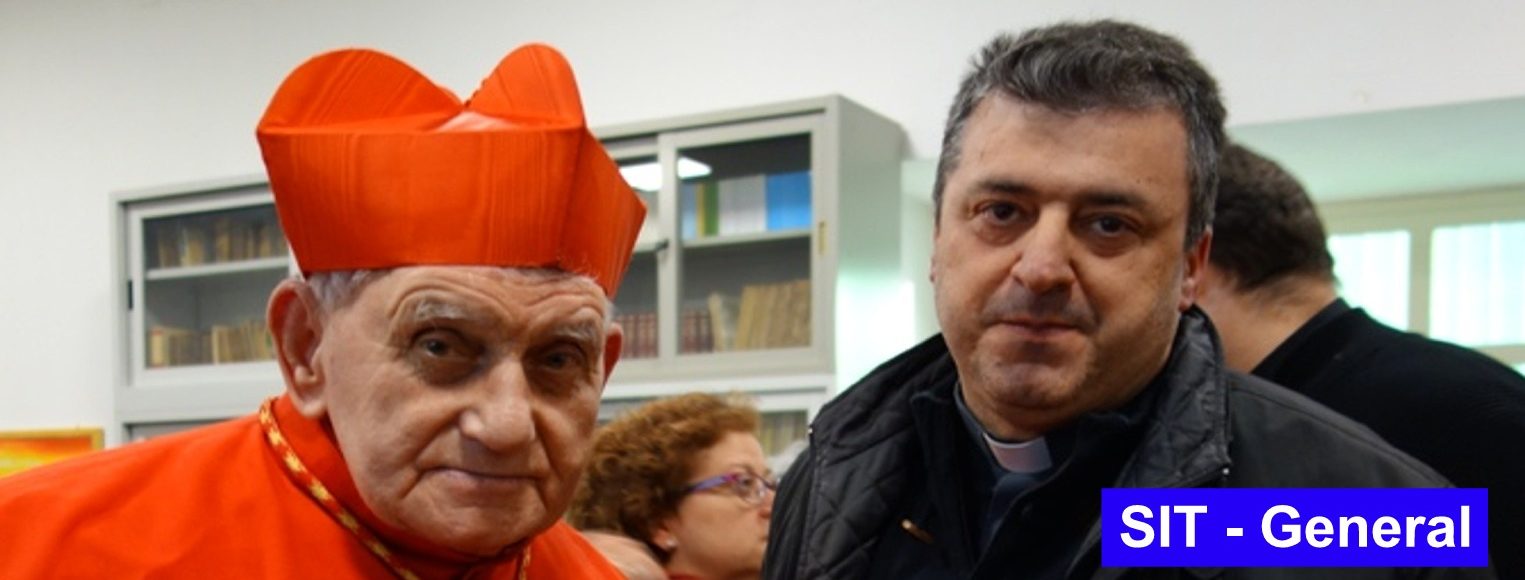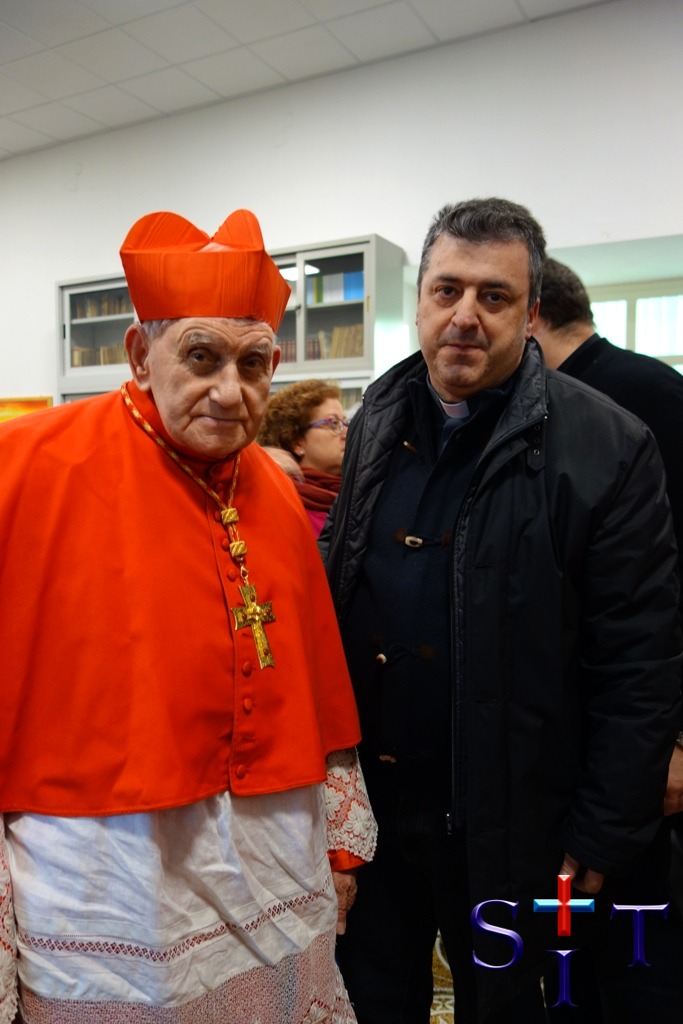Article by the Vicar General of the Order. Published in the Bulletin of Cristo de la Veracruz.
THE CROSS IN THE SEWER.
Reflection after my meeting with Cardinal Ernest Simoni.
Published in Bulletin of Cristo de la Veracruz, Villanueva del Arzobispo, May 2018.
Rev. Pedro Aliaga, O.SS.T. Vicar General of the Order of the Most Holy Trinity and of the Captives (Rome)
The last days of February I went down to Naples, Italy to attend a meeting on religious persecution, organized by SIT (International Trinitarian Solidarity) of Italy. The day after arriving, they tell me that it has snowed in Rome, a very strange thing; On the morning of the 27th, when I opened the blinds of my room, I saw the snow-covered roofs, a very strange thing. It had been 65 years since it snowed in Naples, and I looked out from the opposite side of my room to see the top of Mount Vesuvius, the volcacno, covered in white snow. There’s a commotion in the courtyard because some of my students (= seminarians) are excited because it’s the first time they see snow, and they enjoy it in a big way.
I had been told that Cardinal Ernest Simoni was going to be present at the meeting, and indeed, there he was. We spent three days under the same roof, living in our convent. I had heard about him since he literally made Pope Francisco cry. It was in 2014 when the Pontiff made a trip to Albania; one afternoon was reserved for a memorial meeting for the martyrs and victims of the cruel religious persecution (Catholics, Orthodox and Muslims) perpetrated by the sinister President Enver Hoxha, and there was Ernest Simoni, an 88 year old priest: with great simplicity, he told how he was arrested on Christmas night in 1963, while celebrating the Mass, tying his hands with such force that he thought he was going to die. The story of his what he suffered during the 28 years in which he was condemned to hard labor, was so shocking, that Pope Francis burst into tears.
One Sunday in 2016, he was listening to the radio with his nephew Antonio. Pope Francis announced that he was going to appoint new cardinals; Among the names, he said his. “Uncle, the Pope said he made you a Cardinal.” “How strange, it must be someone else with my same name.” As he received calls from people who congratulated him, Don Ernest said to his nephew: “Call the Vatican, to clear all doubt.” On November 19, 2016, the pope placed the purple biretta on him at a solemn Mass celebrated in the Vatican, making him a Cardinal of the Church.
I looked at Cardinal Simoni, who was eating with me. In October he will be 90 years old. He is a man of strong build, with white hair; I am struck by his hands, they’re robust, hands of a man who has worked hard. He wears a sturdy sweater, and has a simple cross around his neck. He likes to put salt in his soup, we must put the salt shaker next to his plate. He is a man of few words, his nephew Antonio (who always accompanies him) is watching him.
On the 26th, in the afternoon, Don Ernest gives his testimony to all who participate in the meeting. I have to do the simultaneous translation into Spanish, and I have to lock myself in the booth, put on my headphones to hear his words directly and translate at the same time through the microphone into Spanish. I’ve done this before, but this time it bothers me that the cabin is in a position that does not allow me to see either the room or the cardinal who when he is speaking.
Don Ernest starts talking. His Italian, not being very good, is understandable enough. He tells us his life story, with stunning simplicity. Remember how on Christmas night when he was arrested, while celebrating the Mass, police officers entered from the four corners of the church; they tied him up, they took him away, declaring him an enemy of the people. He was condemned to death, like so many other priests and believers in Albania.
While in the dungeon, an infiltrated spy pretended to be a prisoner, and established a conversation with him, trying to get him to criticize President Hoxha. Don Ernest replied simply, saying that Christ commanded to love everyone, and did not speak ill of anyone. The conversation was recorded; the President listened to the recording and commuted the death penalty to 25 years of forced labor. They were 28, since he was imprisoned until the end of 1990.
It seems as if they did not want this man to see sunlight again: for a period was working as a miner, in the dark tunnels of the Spac mines, and then he was taken to clean the sewers of the city of Scutari. Don Ernest tells us about the long work shifts in the tunnels of the mine, about his companions who died due to exhaustion and respiratory diseases, the little food in the concentration camp. he tells us about the tortures he suffered, the beatings on the bottom of his feet. But also that he never denied the faith, nor his priesthood, not even when he was offered a teaching job in Tirana and to marry a beautiful girl; “My wife is the Church,” he replied, “and she’s very pretty!” Don Ernest, in the concentration camp, celebrated the Mass “from memory”, making the host with a little flour cooked on a stove and wine with a little grape juice.
He confessed his fellow prisoners secretly and encouraged them. Inside the cloister of Scutari he celebrated a Mass for 180 people; “If they had discovered this, they would have hanged me.” His testimony moves the room. He is a man of very humble appearance, very simple in his expression. Above him there is a banner with a phrase of the journalist who introduced him: “This man who is before you is a saint, and I am sure that one day he will be canonized.”
I leave the translation booth, and join the many people who come to greet him, I make my way to him and say: “Eminence, can I take a picture with you?”. Later, at dinner, I carry with me the prayer book that accompanies me daily, the breviary, which I pray since I entered the Trinitarian Order. When he finished his plate of vegetable soup, I open it on the first page and say: “Write me a blessing, or whatever you want?”. Without hesitation, Don Ernest takes it and writes in it. When he returns it to me, although I studied paleography, I can not understand the writing. I ask him. And he replies: “Many blessings of Jesus and of the Blessed Virgin”. The signature: “Ernest Cardenal Simoni”. Those “many blessings” of this holy martyr of our time I ask the Lord for those who read this bulletin. And I beg you one thing: When you see the Holy Christ of the Veracruz on the streets on May 3, remember the many people in the world who are persecuted today because they are faithful to Jesus. Do not forget them in your prayers.
[:en]
Article by the Vicar General of the Order. Published in the Bulletin of Cristo de la Veracruz.
THE CROSS IN THE SEWER.
Reflection after my meeting with Cardinal Ernest Simoni.
Published in Bulletin of Cristo de la Veracruz, Villanueva del Arzobispo, May 2018.
Rev. Pedro Aliaga, O.SS.T. Vicar General of the Order of the Most Holy Trinity and of the Captives (Rome)
The last days of February I went down to Naples, Italy to attend a meeting on religious persecution, organized by SIT (International Trinitarian Solidarity) of Italy. The day after arriving, they tell me that it has snowed in Rome, a very strange thing; On the morning of the 27th, when I opened the blinds of my room, I saw the snow-covered roofs, a very strange thing. It had been 65 years since it snowed in Naples, and I looked out from the opposite side of my room to see the top of Mount Vesuvius, the volcacno, covered in white snow. There’s a commotion in the courtyard because some of my students (= seminarians) are excited because it’s the first time they see snow, and they enjoy it in a big way.
I had been told that Cardinal Ernest Simoni was going to be present at the meeting, and indeed, there he was. We spent three days under the same roof, living in our convent. I had heard about him since he literally made Pope Francisco cry. It was in 2014 when the Pontiff made a trip to Albania; one afternoon was reserved for a memorial meeting for the martyrs and victims of the cruel religious persecution (Catholics, Orthodox and Muslims) perpetrated by the sinister President Enver Hoxha, and there was Ernest Simoni, an 88 year old priest: with great simplicity, he told how he was arrested on Christmas night in 1963, while celebrating the Mass, tying his hands with such force that he thought he was going to die. The story of his what he suffered during the 28 years in which he was condemned to hard labor, was so shocking, that Pope Francis burst into tears.
One Sunday in 2016, he was listening to the radio with his nephew Antonio. Pope Francis announced that he was going to appoint new cardinals; Among the names, he said his. “Uncle, the Pope said he made you a Cardinal.” “How strange, it must be someone else with my same name.” As he received calls from people who congratulated him, Don Ernest said to his nephew: “Call the Vatican, to clear all doubt.” On November 19, 2016, the pope placed the purple biretta on him at a solemn Mass celebrated in the Vatican, making him a Cardinal of the Church.
I looked at Cardinal Simoni, who was eating with me. In October he will be 90 years old. He is a man of strong build, with white hair; I am struck by his hands, they’re robust, hands of a man who has worked hard. He wears a sturdy sweater, and has a simple cross around his neck. He likes to put salt in his soup, we must put the salt shaker next to his plate. He is a man of few words, his nephew Antonio (who always accompanies him) is watching him.
On the 26th, in the afternoon, Don Ernest gives his testimony to all who participate in the meeting. I have to do the simultaneous translation into Spanish, and I have to lock myself in the booth, put on my headphones to hear his words directly and translate at the same time through the microphone into Spanish. I’ve done this before, but this time it bothers me that the cabin is in a position that does not allow me to see either the room or the cardinal who when he is speaking.
Don Ernest starts talking. His Italian, not being very good, is understandable enough. He tells us his life story, with stunning simplicity. Remember how on Christmas night when he was arrested, while celebrating the Mass, police officers entered from the four corners of the church; they tied him up, they took him away, declaring him an enemy of the people. He was condemned to death, like so many other priests and believers in Albania.
While in the dungeon, an infiltrated spy pretended to be a prisoner, and established a conversation with him, trying to get him to criticize President Hoxha. Don Ernest replied simply, saying that Christ commanded to love everyone, and did not speak ill of anyone. The conversation was recorded; the President listened to the recording and commuted the death penalty to 25 years of forced labor. They were 28, since he was imprisoned until the end of 1990.
It seems as if they did not want this man to see sunlight again: for a period was working as a miner, in the dark tunnels of the Spac mines, and then he was taken to clean the sewers of the city of Scutari. Don Ernest tells us about the long work shifts in the tunnels of the mine, about his companions who died due to exhaustion and respiratory diseases, the little food in the concentration camp. he tells us about the tortures he suffered, the beatings on the bottom of his feet. But also that he never denied the faith, nor his priesthood, not even when he was offered a teaching job in Tirana and to marry a beautiful girl; “My wife is the Church,” he replied, “and she’s very pretty!” Don Ernest, in the concentration camp, celebrated the Mass “from memory”, making the host with a little flour cooked on a stove and wine with a little grape juice.
He confessed his fellow prisoners secretly and encouraged them. Inside the cloister of Scutari he celebrated a Mass for 180 people; “If they had discovered this, they would have hanged me.” His testimony moves the room. He is a man of very humble appearance, very simple in his expression. Above him there is a banner with a phrase of the journalist who introduced him: “This man who is before you is a saint, and I am sure that one day he will be canonized.”
I leave the translation booth, and join the many people who come to greet him, I make my way to him and say: “Eminence, can I take a picture with you?”. Later, at dinner, I carry with me the prayer book that accompanies me daily, the breviary, which I pray since I entered the Trinitarian Order. When he finished his plate of vegetable soup, I open it on the first page and say: “Write me a blessing, or whatever you want?”. Without hesitation, Don Ernest takes it and writes in it. When he returns it to me, although I studied paleography, I can not understand the writing. I ask him. And he replies: “Many blessings of Jesus and of the Blessed Virgin”. The signature: “Ernest Cardenal Simoni”. Those “many blessings” of this holy martyr of our time I ask the Lord for those who read this bulletin. And I beg you one thing: When you see the Holy Christ of the Veracruz on the streets on May 3, remember the many people in the world who are persecuted today because they are faithful to Jesus. Do not forget them in your prayers.


